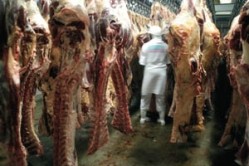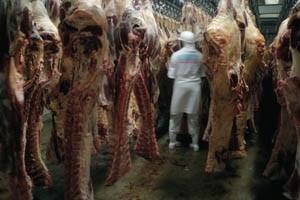Switch to risk-based meat inspections “will take years”

Speaking at the British Meat Processors Association 2010 Conference last Thursday [13.5.10] Flemming Thune-Stephensen, chief advisor to DVM, the Danish Agricultural and Food Council, described the obstacles to change.
“It will take years; there is no doubt about that,” said Thune-Stephensen. “We have quite a resistance from many sides, consumers, the European Parliament and some of the industry as well. So we have to convince a lot of people before it will be approved and adopted.”
His views support those of Food Standards Agency (FSA) chief executive Tim Smith, who in an interview with Food Manufacture in March, described the likely five to 10-year time frame to achieve legislative change as “alarmingly long”.
Thune-Stephensen said the European Commission (EC) had asked the European Food Safety Authority (EFSA) to carry out risk assessment of meat inspections.
“EFSA is supposed to deliver answers on pork at the end of June 2011 and on other species at the end of December 2011,” he said.
“After that the answers from EFSA have to be dealt with within the EC, among stakeholders and so on. And after that the EC will probably come up with a plan.”
More targeted risk-based inspections
UK meat processors, supported by the FSA, and many processors in other EU Members States, would like to see early change from traditional procedures to more targeted, ‘risk-based’ inspections to reduce the cost-burdens associated with an approach that is widely considered inappropriate in today’s environment.
However, a change to EU law is necessary before this can come about.
“Risk analysis must form the foundation on which food safety policy is based,” said Thune-Stephensen.
But, he accepted that convincing consumers of the need for such a change in the rules would be “a tough job”. Smith told Food Manufacture that some high-profile meat-related food safety incidents hadn’t helped the case for change either.
Pan-European lobbying
Thune-Stephensen said, however, that the momentum for change was being cranked up by the ‘Lyon Group’, a pan-European lobby group of like-minded individuals from EU Members States, set up at the instigation of the FSA.
The group includes representatives from the UK, Sweden, Netherlands, Denmark, France, Poland and Hungary, amongst others.
“Meat inspection should be modernised to address the most prevalent and evaluated foodborne pathogens causing human illness as highlighted in the EU annual zoonosis report,” argued Thune-Stephensen.
“Certain detailed meat inspection requirements need to be reviewed as they are no longer in line with modern food safety management practices.” He claimed that some inspections were more about the quality control of meat products than a public health issue.
He argued that Member States should have the flexibility to target pathogens most relevant to them, but added that this was “very revolutionary thinking” against a background of greater harmonisation within the EU.













